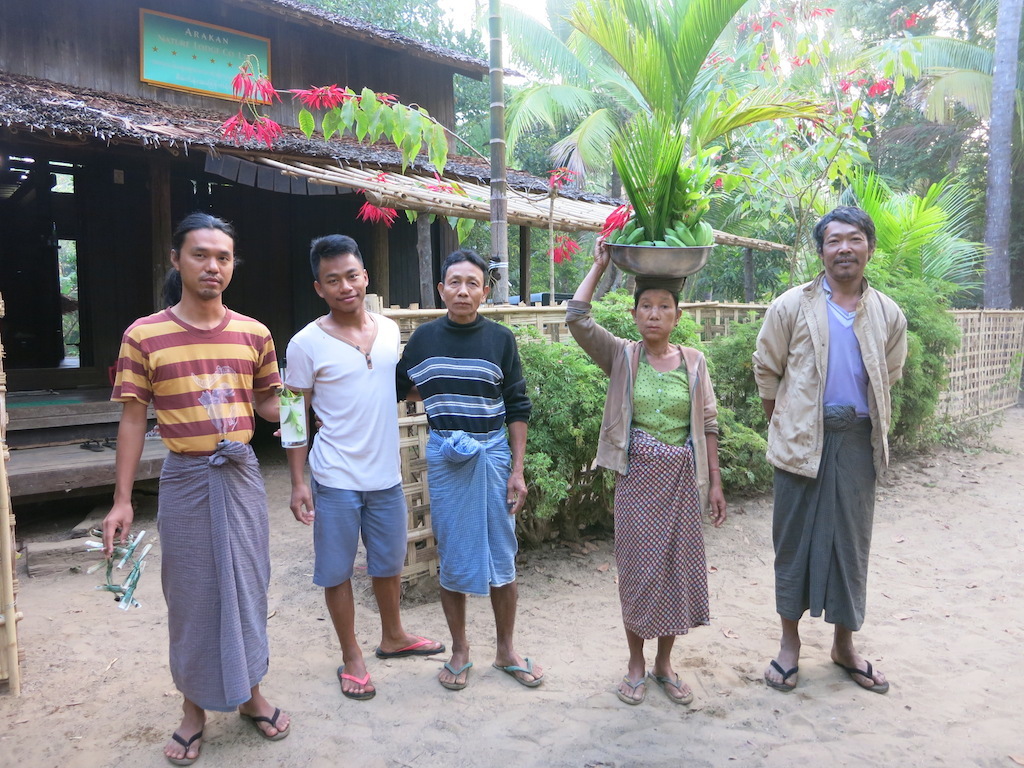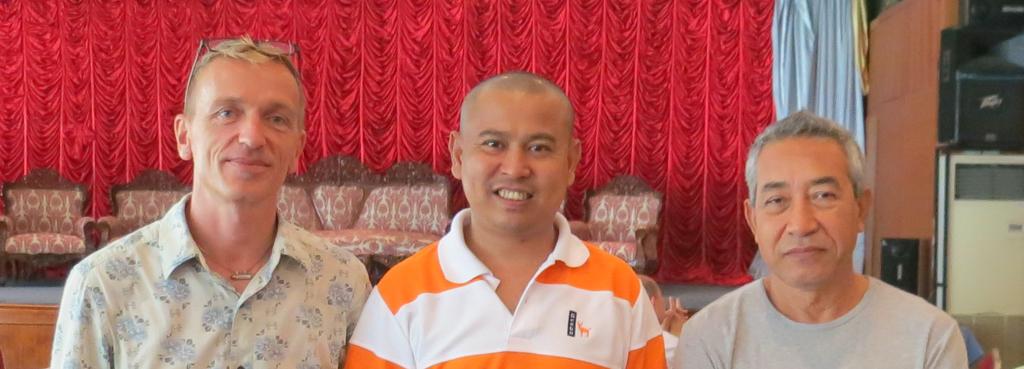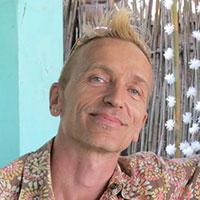Arakan Nature Lodge Project started coming together in 2012. I had just completed my first round of work as SPA trainer and Guest Relations in a new high-end hotel in Ngapali and at last was free to venture down the rugged costal road of the largely untraveled southern Rakhine State, keen to discover Kanthayar and Gwa. I needed to see with fresh eyes where the gaps were in the provision of a different, cultural, more organic approach to tourism. To be honest with you, I was leaving Ngapali Beach with more questions about beach tourism than answers.
My lack of professional hotel background was probably a real blessing and key feature for me to let such questions arise with an extra-open heart and inquiring mind. So after those first seven months of hard work in “paradise”, when I jumped on the bus, this is what I carried along as “accompanied luggage”:
- The extreme gap and extra sharp border between the local community on one side of the Ngapali road and the affluent hotel business on the other.
- A clear promotion of one type of upmarket beach tourism favouring certain rich hotel owners ahead of all others.
- Ignorance, greed and carelessness regarding the use and share of natural resources like clean water, energy and beach space between hotels and locals.
- Failure to follow even the few labour laws in place, and an alarming state of affairs regarding waste management.
- Seemingly lawless and random building activity leaving big footprints by privileged and sometimes questionable owners, putting the famed beauty of Ngapali’s natural environment at stake.
Clearly solutions to many of these problems are beyond my remit being concerned with short-sighted hotel owners and local governmental reality. However, I thought I could show my distaste of this thoughtless and damaging behaviour by developing a resort that will fly in the face of the ignorance and greed shown so far in many parts of the industry.
Just four and a half hours of a jumpy Yoyo-Bus ride later I got down at Kanthayar, settled in the military guest house – and found myself worlds away from where I had just come from. The following days I discovered the beaches and villages around until I sat down and watched the sunset at Zikhone village beach…and did not feel like moving again. I was stunned! What a place, absolutely fantastic! The beach was white and gently curved, smaller than Ngapali but not too small as well. The surrounding hills nicely framed the place and the beach dropped perfectly into the sea, neither too steep nor too shallow. Last but not least there was something in this village that felt so different from all other places I had seen – a radiation of peaceful protection combining with an aesthetic set-up and originality of Rakhine life that deeply touched my soul.
The rest of our story then just naturally ensued. I was able to take my oldest and closest Myanmar friend on board with the idea of building a true eco lodge in this unspoilt place. Luckily, he showed true interest and readily joined hands. That very moment proved to be the start of an exciting and adventurous journey – the seemingly impossible making of Arakan Nature Lodge.
Back to Scratch!
From 2012 to 2013 I joined work at the same Ngapali hotel for yet another full season. I had felt I needed to deepen my knowledge of what it means to be operating a hotel in Myanmar. I took part in the first stakeholder meeting that was locally held in the wake of developing Myanmar’s current official tourism master plan. This gathering of hotel owners, boat- and fishermen, community members and government officials revealed many of the concerns and unresolved issues like sand mining, waste mismanagement or unfair share of space on the public beach front, naming only a few. It only confirmed my feelings that much with beach tourism (as in many parts of the world) is just going the wrong way.
Researching
After my second season of practical learning was complete, I ventured to Bali and to some places in Africa in order to learn about eco lodges more practically. I also wanted to get some first-hand guest experience. Getting a chance to talk with the owners was revealing. It made me aware of the various degrees of care and innovation regarding best practices of sustainability and eco friendliness. I also learnt that eco labelling could turn into a kind of empty fashion and PR strategy simply to catch and cater to the growing numbers of environmentally and socially aware tourists without concern for the real ethos underpinning it.
Eco Tourism
In September 2013 I took part in the “Ecotourism and Sustainable Tourism Conference” of TIES– The International Ecotourism Society – in Kenya, where I attended the “Authentic Ecolodges Planning and Design Workshop” by world famous eco-architect, Hitesh Mehta http://www.h-m-design.com. I learnt the basics of what makes up a true eco lodge. I was able to engage in discussions with workshop teachers and conference speakers like Karen Lewis, owner of the world-renowned, award-winning Lapa Rios Eco Lodge in Costa Rica (link here), and Sybille Riedmiller, founder of the amazing Chumbe Island Coral Park in Zanzibar. Civil engineer Chris Rollins held a workshop on green technologies for eco lodges, highlighting their pros and cons with planning and effective implementation. The conference provided me with so much inspiration and fascinating personal contacts that it was crystal clear what we were going to do once back in Myanmar: We would build Myanmar’s first true eco lodge.

With Architects
Then followed a time when I started to work with architects. This engagement was revealing insofar as a major decision had to be made: Would we want to build something completely new and innovative – with recycled and sustainable materials? Or would we want to engage in local building tradition and make ready lodging that does not stick out as different, but would give visitors the chance to experience real Rakhine houses with their obvious and hidden comforts and superiority over the concrete and glass units of Ngapali?
Not without hesitation we finally chose the second approach. A Swiss star architect couple gave me the following advice: Don’t use an architect! Just only collect old recyclable houses from the area around and rebuild them with the most able local carpenters. Then invest as much as you can in the interior design and feel. I liked that! Architects warning me of their own kind! As luck would have it we then met with a maverick in his profession – U Aung Soe Myint – a truly unique, local architect who fully understood what was at stake and reconfirmed this view. He had built the 5 Star Resort Nga Laik Khantar in Nay Pyi Taw, Myanmar’s new phantasmagorical capital, out of recycled and restored Bamar village houses. He proved to be an ideal expert and a very practical, friendly advisor in planning our next steps. U Aung Soe Myint consented to draw up the architectural plans for our building permit application with the individualistic approach we had in mind. We are really blessed to have this delightfully eccentric and deeply human character as our project friend oftentimes causing fun and laughter.
Chris Rollins, the civil engineer I had met at the TIES conference, came over from Africa to inspect our site and give first ideas about the best technologies in the scale suitable for this project. He outlined a solar energy system, sketched our fresh water system and evaluated grey water recycling. We considered the option of high-end urine-separating dry- composting toilets, quite a revolution in the country; nobody we know of employs this technique at all. Although it sounded extreme at first, this started making sense. We would be drawing all our freshwater supply from the pristine shallow wells around and I simply would not countenance producing any black water from that precious water of ours. Also, I wouldn’t want to let black water go back into sewage tanks that may be leaking underground and prone to overflow during the heavy monsoon rains, when water levels rise everywhere to near ground level. Well, hadn’t I seen enough of that elsewhere already?

Let’s do it!
Our two companies then got established in 2014 – Arakan Nature Lodge Co. Ltd., founded by our local friendly partners – and EcoStart Myanmar Co. Ltd., my own company to plan and assist in financing, building and managing this first eco lodge project.
Today in 2016, after four years of mastering the maze of local bureaucracy and getting more local and Swiss partners involved to invest in our idea, Arakan Nature Lodge is becoming a reality, with building permits properly obtained and activities started. The timing of our building commencement auspiciously coincides with the first 100 days in office of our newly, first-ever democratically elected government in Myanmar. We are looking forward to more positive changes lending a hand to make our visions of a more sustainable, original, and beneficial kind of tourism come true!
Arakan Nature Lodge’s first and foremost mission extends towards:
- Facilitation of a culturally connected and unobtrusive guest experience off the beaten track. We offer a sense of belonging to an amazing natural and generous space combined with a retreat from the world to reconnect with nature’s most powerful gifts – serenity and adventure.
- The safeguarding of our lodge’s unspoilt grounds with an emphasis on nature preservation, with careful attention to the surrounding areas of our village and the marine environment.
- To engage with respectful investments and poverty alleviation initiatives in peaceful southern Rakhine State, considered one of the most downtrodden states of Myanmar. We will create job opportunities in and around lovely Zikhone village, working with the assets and true potential it already has towards ecotourism.
Today, our building philosophy is set. We will build the lodge with local carpenter teams from all the villages around. Thus we can ensure that a significant share of the cash to be spent during the building phase goes directly to our community members as building fees. We build with sustainable and recycled, traditional, local building materials and manual techniques. We let natural beauty reveal itself unobstructed and will share with our guests the cool and cosy logic of the traditional Rakhine houses as if staying in our village. To date, apart from very few exceptions, village stays have not been legally possible for tourists in Myanmar.
Our team on the ground is engaging in village matters like ambulance transport and road repairs already. We are in hopes of bringing in initiatives to explore and protect what is left of the untouched wildlife, nature and marine costal assets around Zikhone. Starting ecotourism activities in our area is simply the most promising way to achieve a better future.
We are opening on 1st or October 2017. Once we are up and running, we do hope you can make it to come around and see for yourself. We invite you to discover what makes our lodge so different – green in all aspects – set in nature with space. First and foremost enjoy Zikhone’s spectacular beach where swimming is safe with crystal clear waters around you. Our intimate team of village guides may introduce you to the community and if you whish to know, share in its ancient way of life and show you hidden paths for walks and excursions to secret places around.

Thank you for reading our story, with appreciation
Myo Kyaw Thu
Arakan Nature Lodge Project Director, without whom this wonderful project would not have taken off nor progressed as well!







